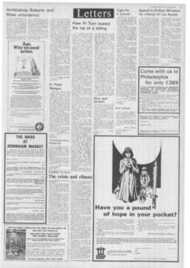Page 6, 9th April 1976
Page 6

Report an error
Noticed an error on this page?If you've noticed an error in this article please click here to report it.
Tags
Share
Related articles
Radio The Voice That Can Go Everywhere
Commission Calls For Inquiry On Broadcasting
Bringing God To The Airwaves
Vatican Radio Has Been Around Longer Than The Bbc World
Local Forces In Radio Market
Conference on Christian broadcasting PiYar - ,I.ofaysceca,,n.
1T seems that struggling writers who cannot get their work published should try radio ... and especially local radio stations. This was the view of a lively team of experts drawn from the world of television and radio at a one-day conference held recently by the Fellowship of Christians in the Arts at the Institute of Christian Studies.
Mr John Forest. of Thames TV, opened the conference with a potted history of how local radio i,iiitions had come into operation. He said it was a long, hard struggle before the Government would consent to the first of these stations I Radio Durham). and even then it was still saying that local radio could not possibly succeed.
This gloomy forecast had not proved correct, because there were now ZO flourishing local BBC stations putting out daily programmes.
Mr Nick Page. producer of the programme Sunday Supplement iLFIC) which goes out for Iwo and a half hours on Sundays, said they were always interested in hearing from Christian writers, or others who would like to hike part in their programmes. Ideas were always welcome.
He said his programme was not aimed at converted Christians, but rather at the public and especially the non-churchgoer. Writers, lecturers. and those interviewed should avoid using religious clich6s, such as "We had a
very blessed , "He was called to his rest," and so on. The average non-Christian, especially of the younger generation, simply would not understand what these sort of phrases meant. On the other hand, when speaking on radio or writing for radio, perhaps on the subject of other nonChristian religions, it was right to make one's position clear and firm.
Mr Page's programmes consist of competitions for which prizes are given, an interview with someone in the religious world who may be doing something of importance right now or has just arrived in town. It might be a missionary. a writer, a priest of a Member of Parliament.
There is always a discussion or debate or lecture on a serious sub
jest such as abortion or Christian education. A review of Christian books recently published, or Chris. tian exhibitions, is given weekly.
Mr Chris Rees, of Thames TV and formerly of BBC radio and TV, gave some idea of the technical side of radio broadcasting. He called his short talk: "How little must you know about the technical side?" He showed various pieces of equipment and demonstrated how to use them.
In the afternoon Mr Rob Cochrane, script editor of the religious programme "Look Out." broadcast on Radio Medway, gave hints on writing for religious broadcasting. He emphasised the impor.lance of creating characters who were believable, and of letting the message come through naturally. The message should only be 4 per cent of the subject matter 96 per cent should he entertainment.
The first minute of the script was vital. It had to grip the listeners or they would switch off. Mr Cochrane's programme uses seven
minute plays, which he prefers to call sketches. He needs one a week, and is always eagerly looking for new script-writers who can produce good sketches for him.
Mr Cochrane, along with Mr John Forest and Mr Chris Rees, won the award for the best Christian play in the international radio play competition organised by the Catholic Church. Excerpts from their "Foxes in the Vineyard," were played. The subject which was set by the Chdrch for this play was reconciliation between God and man. "Foxes in the Vineyard" was taken from the Song of Solomon.
Fiona Satow, who reviews books by Christian writers on LBC, spoke of the difficulties of being a critic, and the pitfalls of being too unkind or. worse still, over-kind. One had a responsibility towards potential readers.
She spoke with enthusiasm of a new hook. "Where is the Pope?" by Gerard Bessiere, published by Burns & Oates. This book was shown round the room as art example of good modern writing which yet got the Christian Message over.
Mr Cochrane spoke of his tremendous admiration he had for the work done at Hatch End by the Catholic Centre for Radio and Television.
Though the larger part of the audience attending the Fellowship of Christians in the Arts is Anglican, I have always found a very friendly spirit extended to those of us who are Catholic. I continue to wish more Catholics would join.
The Fellowship again this year organised a competition for Christian poems. They have been judged by Miss Frances I forovitch, and the winning 30 will again appear in an anthology, This can be ordered from the Fellowship.
The winning poems will be read at the poetry festival on April 24 at the Institute of Christian Studies. Readers may he interested to know that my own poem, "Identity." will he among those read and will also appear in the new anthology.
blog comments powered by Disqus











